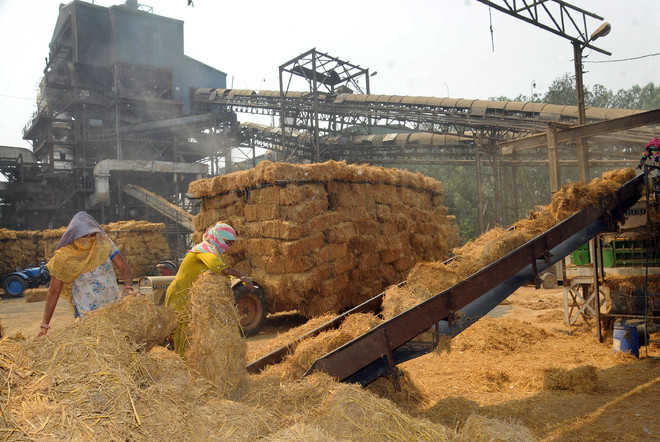
From waste to energy: A number of progressive farmers are engaged with biomass power plants Tribune photos: Pawan Sharma
Sarika Sharma
All of Punjab’s agriculture is gold. And all of Punjab’s agricultural waste can be turned into gold. This waste has huge potential, but remains largely untouched. Some of it is used as fodder, but most of it is burned, famously causing the Capital to choke. The main culprit here is paddy straw, which is unpalatable for the cattle. Punjab has to deal with 15 million tonnes a year; the rest — wheat straw and other bio waste — is around 5 million tonnes. This agricultural waste is called biomass and there are plants in Punjab turning this waste into energy.
What is biomass?
Biomass is leftover material after crops are harvested. This can be wheat straw, paddy straw, remains from cereal plants, pulses and groundnut, leaves from trees and sugarcane waste. While most of this waste is used to feed the cattle, paddy straw is indigestible for animals. As it is not the norm to treat it and make it digestible for the animals, the easiest way to deal with it has been burning the stubble. However, our environment and health have been bearing the brunt. A lot of hue and cry has been raised over stubble burning, but there has not been a solution. Last year, Punjab Chief Minister Capt Amarinder Singh was reported to have announced a cash award of $1million to any person/agency that comes up with a viable solution for pollution-free management of stubble. No one is known to have claimed it yet.
Bale out
For Pawanpreet Singh Dhillon, who has been running a plant near Gidderbaha for 10 years, the answer lies in biomass power plants. “For the sake of environment and people, there can be no better solution as these make use of biomass to produce energy,” he says.
While ‘happy seeder’ is often promoted in the state, Dhillon says the machine manages too little waste and is not convenient. Vis-a-vis the happy seeder, he feels balers are a far better option. “A happy seeder just cuts the straw. However, in the other technique, a reaper attached to a tractor cuts the straw and spreads it across the field. A rake then collects the hay and assembles it into rows and a baler makes bales. These balers are transported to a power plant where it is burned to produce energy and the field is ready to be used.” He says several progressive young farmers are now engaged with biomass power plants across the state — 50 with Dhillon’s plant alone — and are collecting paddy straw from villages around.
Generates employment
Those who vouch for biomass power plants feel its benefits cannot be measured merely in terms of the power it generates. Tej Pal Singh, who has a plant in Khokhar Khurd village of Mansa, says critics of biomass power plants raise a hue and cry over the cost of power generated; power from other sources costs Rs 3.5 to 4 per unit and from a biomass power plant Rs 7.5. He says the detractors must look at their larger purpose of providing a better environment and employment generation.
“Every year, the environment suffers a lot because of stubble burning in Punjab. Besides causing many accidents, stubble burning poses health hazards. Have we been able to find a solution to the problem? No. During the paddy season, eight to 10,000 persons are engaged in the process of procuring paddy straw and bringing it to the plant. We then store it for a year, which means some people are handling it throughout that period. Otherwise, how many employment opportunities are there in a village,” he says. At his power plant, 10MW electricity is produced and around 50 balers are engaged in paddy straw procurement from the 30-km circle around the plant.
To those who ask how to gauge the success of a biomass power plant in curbing the stubble burning menace, Tej Pal says stubble fires are negligible in the areas where these plants exist. Dhillon says one can check remote sensing data of the area and see how much the menace has come down. Also, the residue from a biomass power plant — ash — returns to the field and acts as a fertiliser, he adds.
And while he says that returns to farmers are not very good as of now — one quintal fetches Rs 250 — it is just a matter of time. He returned from Denmark recently, where he was checking out the latest technology in biomass power plants before setting up two more units in Punjab. He tells that people there have the choice to sell stubble to whoever is offering a better price. And there too, ash returns to the field to produce gold, once again.
Present defines future
According to NPS Randhawa, CEO of the Punjab Energy Development Agency (PEDA), the future of biomass plants is bright with major companies showing interest. He has held meetings with Shell, Indian Oil and Mahindra and Mahindra and all have shown interest in biomass energy. He says PEDA is promoting it by giving single window clearance and various subsidies. However, Pawanpreet Singh Dhillon feels government’s pace is slow in sanctioning more projects. “At least 10 PPAs (Power Purchase Agreements) are yet to be done,” he says and feels that the government talks about the problem only when smoke fills the region. “One rain, and the issue is washed away, only to be raised a year later. Punjab has to think of a way to deal with stubble on a large scale,” he says. Tej Pal Singh says that if every district has one plant, the situation could be handled.



























